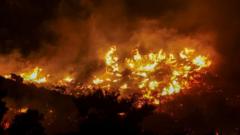The Greek island of Crete is currently facing a catastrophic wildfire that has prompted mass evacuations in the eastern region, particularly near Ierapetra. The blaze erupted on Wednesday afternoon, quickly escalating due to strong winds, with gusts measuring up to eight on the Beaufort scale. Emergency services are reporting that the fire front spans over 6km, complicating containment efforts as it spreads southward.
Thick smoke has enveloped much of the area, severely impacting visibility and air quality. Tourism hotspots like Makry Gialos beach are feeling the effects, with smoke clouds drifting far from the origin of the fire. Emergency protocols are in place, including road closures and a plea from authorities for residents and visitors to avoid non-essential travel due to hazardous conditions exacerbated by heat and ashfall. Reports confirm destruction in areas such as Agia Fotia, where homes and properties have been lost and power outages are common. In response to smoke inhalation issues, several elderly individuals have been hospitalized, and health authorities have placed all hospitals across Crete on alert.
Authorities have initiated a large-scale evacuation of hotels, rental units, and homes in the Ferma municipality as flames threaten the surrounding areas. To date, roughly 1,500 people have been evacuated, many directed to safety in Ierapetra, where shelters have been set up in local sports facilities.
In response to the emergency, firefighting resources have been significantly bolstered. By Wednesday night, around 155 firefighters, multiple foot teams, and fire engines were deployed to battle the blaze. Air support included four helicopters conducting water drops until darkness fell. Additional forces, including specialized firefighting units, are en route via maritime and aerial transport.
Public warnings have been distributed through the official 112 system, directing evacuations from impacted areas including Achlia, Ferma, and Agia Fotia. Some individuals caught off by blocked roads were even rescued by boat from nearby beaches. The fire is believed to have ignited between Agia Fotia and Skinokapsala, feeding on dense forest and dry conditions—a combination that has proven particularly challenging for containment.
Meanwhile, wildfires have also affected other regions in Europe. Recently, Turkey evacuated over 50,000 people due to wildfires, and nations like Spain and Italy have reported fatalities linked to the ongoing heatwave impacting the continent. With six heat-related deaths reported, the urgency for effective climate and fire management has never been more evident.
Thick smoke has enveloped much of the area, severely impacting visibility and air quality. Tourism hotspots like Makry Gialos beach are feeling the effects, with smoke clouds drifting far from the origin of the fire. Emergency protocols are in place, including road closures and a plea from authorities for residents and visitors to avoid non-essential travel due to hazardous conditions exacerbated by heat and ashfall. Reports confirm destruction in areas such as Agia Fotia, where homes and properties have been lost and power outages are common. In response to smoke inhalation issues, several elderly individuals have been hospitalized, and health authorities have placed all hospitals across Crete on alert.
Authorities have initiated a large-scale evacuation of hotels, rental units, and homes in the Ferma municipality as flames threaten the surrounding areas. To date, roughly 1,500 people have been evacuated, many directed to safety in Ierapetra, where shelters have been set up in local sports facilities.
In response to the emergency, firefighting resources have been significantly bolstered. By Wednesday night, around 155 firefighters, multiple foot teams, and fire engines were deployed to battle the blaze. Air support included four helicopters conducting water drops until darkness fell. Additional forces, including specialized firefighting units, are en route via maritime and aerial transport.
Public warnings have been distributed through the official 112 system, directing evacuations from impacted areas including Achlia, Ferma, and Agia Fotia. Some individuals caught off by blocked roads were even rescued by boat from nearby beaches. The fire is believed to have ignited between Agia Fotia and Skinokapsala, feeding on dense forest and dry conditions—a combination that has proven particularly challenging for containment.
Meanwhile, wildfires have also affected other regions in Europe. Recently, Turkey evacuated over 50,000 people due to wildfires, and nations like Spain and Italy have reported fatalities linked to the ongoing heatwave impacting the continent. With six heat-related deaths reported, the urgency for effective climate and fire management has never been more evident.




















